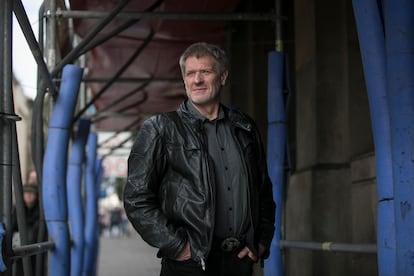Biologist David Bueno: ‘Human beings are the only species with a teenage phase’
In his latest book, the Spanish researcher describes the changes that the adolescent brain undergoes, and the factors that make this period of human life so challenging yet life affirming

Adolescence is a time full of physical and mental changes, with many unknowns for parents and teens alike. Why are teenagers so indecisive? Why do they rebel? And why do they want to go to bed so late? The biologist David Bueno, 56, has chaired the Neuroeducation department at the University of Barcelona since 2019. In his latest book published in Spanish, The Adolescent Brain, he seeks to answer some of these burning questions. Bueno has been studying the human brain for more than a decade, and quotes psychologist Jaume Funes to explain his view of teenagers: “We must love adolescents the most when we think they least deserve it.” In other words: the stranger teenage behavior may seem, the more they need their loved ones by their side.
Question. You say that adolescence makes us human, what do you mean by that?
Answer. We are the only biological species that has an adolescence as such. All animals go directly from childhood to youth simply because they don’t have to learn anything new. They learn what they need to learn when they are young and go straight through youth to adulthood. Humans have such a complex brain and we have to learn so many things that these two stages are not enough.
Q. What changes does the brain undergo during adolescence?
A. A huge number. A part of the brain called the prefrontal cortex, which is associated with the most complex behaviors, is reconstructed, affecting planning, reflection, decision-making and emotional management, or becoming aware of oneself. It is the area that undergoes the most changes precisely because we have to leave behind all our childish behaviors, based on adult support, in order to start directing our own lives. There will no longer be adults who are constantly supporting or protecting us. This reconstruction is what makes adolescent behaviors sometimes so curious and so difficult to understand from an adult perspective.
Q. What differentiates the adolescent brain from the adult brain?
A. Basically the capacity for self-management. Teenagers are maturing, so they have moments when they can manage their own behavior, but many moments when they cannot. The adult brain is much more capable of making medium and long-term plans, of establishing goals and of knowing how to find the inner resources to move towards those goals. Adolescents are just trying all of this out.
Q. What are the factors that determine adolescent behavior?
A. There are genetic factors that influence adolescent behavior, but of course, we can’t do much about those. Where we can have an influence is in how we raise children. Their experience of childhood has a direct effect on the perceived support they have at home. That is fundamental for the development of a young person. Negative parenting means little or no emotional support, and in the most extreme cases, it implies rejection and hostility towards the children themselves or a lack of coherence between reward and punishment. Positive parenting is the opposite: emotional support that is not overprotective (if it is overprotective, it becomes negative or may become negative), with its own challenges and responsibilities appropriate to the child’s age. There is a coherence between reward and punishment. Teenagers who have had a negative upbringing are in general much more impulsive and therefore less reflective. The reflective area of the brain does not mature as efficiently, and they may therefore be more likely to manifest aggressive or depressive behaviors.
Q. What are the greatest dangers for teenagers?
A. The main dangers are a negative childhood in the broad sense, and an adolescence where they do not find support from the adults around them. Emotional support continues to be fundamental during adolescence. This is a time when they are very lost. They have to live with adults, they often have to behave like them, but they have no experience of the adult world because they have never been adults. Any attempted shift in their attitudes has to be done in a positive way, as an opportunity.
A teenager only stops behaving like a teenager when their adult environment accepts them and values them
Q. What are the key ways to help a teenager experience these years normally if you are an adult in their life?
A. Emotional support, because the adolescent brain imitates what it finds around it, and we adults should be an example of what we would like them to be, and encouragement so that they find their own motivation and meaning in life.
Q. The word adolescence and puberty are often used as synonyms, what is the difference between the two?
A. Puberty is the beginning of adolescence, with the first hormonal changes of the reproductive system. Adolescence is everything else, so all these new behaviors, the sociability typical of youth and adulthood, maturity in reflecting on things and emotional management. The biological beginning is the hormonal activity of puberty, but the end of adolescence is a mixture of biology and culture. A teenager only stops behaving like a teenager when their adult environment accepts them and values them with the equal rights and responsibilities of another adult.
Q. Socialiability, as you just mentioned, is a trait of humans in general, but especially of young people, specifically with people of their own age. How has the pandemic affected the teenage brain?
A. In a terrible way. I wrote a report for UNESCO about the very marked increase in anxiety, stress, sadness and depression, precisely due to the social isolation of the pandemic, and often coupled with a sense of guilt. I read that if the first or second wave did not abate it was because adolescents did not comply with the rules. I don’t know if they complied or not, but many adults didn’t either. This sensation of guilt made them feel bad because they thought: “I can’t go out, I can’t socialize and on top of that it seems that I am also to blame.”
Q. Teenagers have a different sleep schedule. What is the biological reason for this difference, compared to the other stages of life?
A. The biological explanation is that there is a delay in the production of the hormone melatonin, which is what makes us sleepy at night. This cycle is delayed by a couple of hours on average when we reach adolescence. We don’t know why this happens, but there are several hypotheses. This is very important in education, as adjusting classes to their rhythm would mean them starting a little later. At the very least they should not be doing the most demanding subjects first thing in the morning, because the brain has not woken up yet, biologically speaking.
Q. Generation after generation rants that young people are becoming more and more irresponsible, immature and selfish. Why?
A. Even the Ancient Greeks said this, and it’s just not possible that teenagers have got progressively worse since then, because we would have gone extinct centuries ago. The adult brain makes it difficult for us to understand teenagers because our brains are very linear. All the stupid things we did as teenagers are practically forgotten, and we remember only those key moments that led us to become what we are today. That makes it difficult for us to understand teenagers and that’s why they seem to be getting worse.
Tu suscripción se está usando en otro dispositivo
¿Quieres añadir otro usuario a tu suscripción?
Si continúas leyendo en este dispositivo, no se podrá leer en el otro.
FlechaTu suscripción se está usando en otro dispositivo y solo puedes acceder a EL PAÍS desde un dispositivo a la vez.
Si quieres compartir tu cuenta, cambia tu suscripción a la modalidad Premium, así podrás añadir otro usuario. Cada uno accederá con su propia cuenta de email, lo que os permitirá personalizar vuestra experiencia en EL PAÍS.
¿Tienes una suscripción de empresa? Accede aquí para contratar más cuentas.
En el caso de no saber quién está usando tu cuenta, te recomendamos cambiar tu contraseña aquí.
Si decides continuar compartiendo tu cuenta, este mensaje se mostrará en tu dispositivo y en el de la otra persona que está usando tu cuenta de forma indefinida, afectando a tu experiencia de lectura. Puedes consultar aquí los términos y condiciones de la suscripción digital.









































